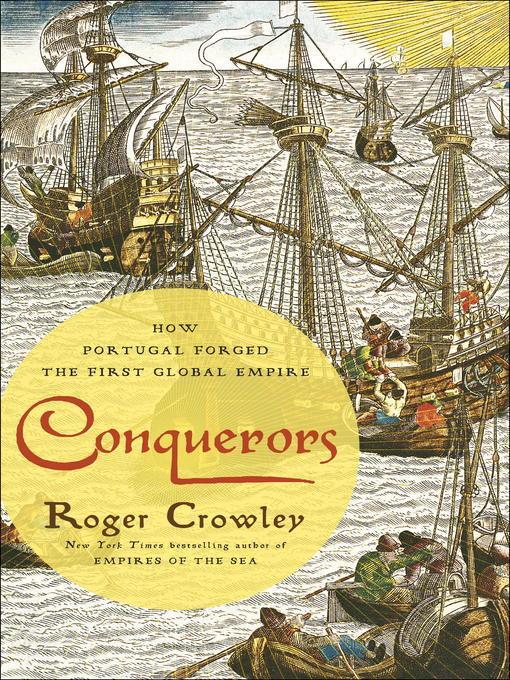
Conquerors
How Portugal Forged the First Global Empire
کتاب های مرتبط
- اطلاعات
- نقد و بررسی
- دیدگاه کاربران
نقد و بررسی

October 12, 2015
Crowley (Empires of the Sea) charts how, beginning in 1415, Portugal diligently explored sea routes around Africa and India, intent on creating a new non-Mediterranean course for trade, which resulted in a complete upheaval of the multireligious and multicultural governance of the Indian Ocean’s trade routes. In a flowing narrative, he demonstrates kings João’s and Manuel’s high expectations of regional dominance, and brings to life the Portuguese explorers Vasco da Gama, Afonso de Albuquerque, and Francisco de Almeida. Detailed descriptions address the high mortality of seafaring, and Crowley documents the turmoil inflicted upon native cultures as the Portuguese refused to compromise or give credence to local customs or the rank of non-Christians, even as they indulged in a side quest for a near-mythical Ethiopian Christian king. Surprisingly, there’s no discussion of the Portuguese sailors’ attitude toward Muslims after centuries of Moorish invasions and war on the Iberian Peninsula. Perfect for anyone who likes a high seas tale, these “Portuguese pirates” prove that resilience and superior firepower—as well as “banning the construction of globes and the reproduction of charts” to keep knowledge from their trading rivals in Venice—established Portuguese dominance in a high-stakes, high-rewards game for power that permanently changed global relations and trade, all in 30 short years. Agent: Andrew Lownie Literary Agency (U.K.).

Starred review from September 1, 2015
Portugal's bloody, defiant imperial adventure. In a riveting narrative, Crowley (City of Fortune: How Venice Ruled the Seas, 2012, etc.) chronicles Portugal's horrifically violent trajectory from "impoverished, marginal" nation to European power, vying with Spain and Venice to dominate the spice trade. The story begins in 1479, when Spanish and Portuguese delegates met in Tordesillas, Spain, "to bargain for the world." The rival countries, intent on finding a sea route to the Indies, "simply cut the globe in two with a vertical line through the Atlantic Ocean." With Isabella and Ferdinand funding explorers such as the "unreliable fabulist" Columbus, King Manuel of Portugal made his own grand plans. "Manuel," writes the author, "was incapable of distinguishing men of true merit from the inept, the corrupt, and the self-interested." Among the worst was the ferocious Vasco da Gama, angry, short-tempered, and a fanatical hater of Muslims. He became the face of Portugal for sultans, villagers, and seamen as his fleet pillaged, threatened, murdered, and dismembered in their assault on Africa and India. Crowley describes in gory detail Portugal's collision with "a polyethnic world...more deeply layered and complex" than they could understand, a world that fueled the "deeply rooted idea of holy war as a Portuguese vocation." The author also vividly re-creates the dire conditions endured by explorers and their crews. Food deteriorated, and worms devoured biscuits and meat as well as the boards of ships; drinking water became increasingly foul, and scurvy could wipe out an entire crew in 111 days. The Portuguese project came to be overseen by Afonso de Albuquerque, a "highly intelligent, tortured man" who applied the nation's technological expertise to a flexible strategy of defensible forts, a network of bases, and "the necessity for exemplary violence" against Muslims. An impressive history of global clashes, religious zealotry, and economic triumph.
COPYRIGHT(2015) Kirkus Reviews, ALL RIGHTS RESERVED.

October 15, 2015
Crowley (Empires of the Sea) offers a play-by-play of how Portugal became the first European global power-empire. Starting in the late 15th century, this peripheral European country started amassing navigational knowledge that allowed its sailors to eventually round the tip of Africa and enter the cosmopolitan sea-trading area of the Indian Ocean. The Portuguese presence signaled the end of Muslim and Indian domination of the world's important sea-trade routes--and the beginning of European hegemony in it. Crowley's detailed investigation of how the country built up its empire follows the people and events that led to a shift in economic domination and hence, world power. The author explicitly shows the cultural misconceptions, miscommunications, technological superiority, and sheer hubris that resulted in a newcomer population dominating a majority one. Although aimed at those who enjoy their history filled with intricate details vs. overarching themes, this chronicle brims with larger-than-life figures and epic battles, both between men and nature. VERDICT This chronicle will be of interest to history buffs and a welcome read for those who appreciate accounts of naval battles, the European "Age of Discovery," and the history of marine travel and trade on the seas.--Laura Hiatt-Smith, Conifer, CO
Copyright 2015 Library Journal, LLC Used with permission.

July 1, 2015
Crowley spent some of his childhood in Malta, hung around Greece the summer after finishing school, and taught in Istanbul after reading English at Cambridge, and his enduring interest in the history of the Mediterranean shows in his first three books: Constantinople: The Last Great Siege/1453; Empires of the Sea: The Siege of Malta, the Battle of Lepanto, and the Contest for the Center of the World, a Sunday Times (UK) History Book of the Year in 2009 and a New York Times best seller; and City of Fortune: How Venice Ruled the Seas. Here he turns his attention to Portugal's entrance into the empire game--and cutthroat dominance of the spice trade--after Vasco da Gama discovered a sea route to India.
Copyright 2015 Library Journal, LLC Used with permission.

























دیدگاه کاربران